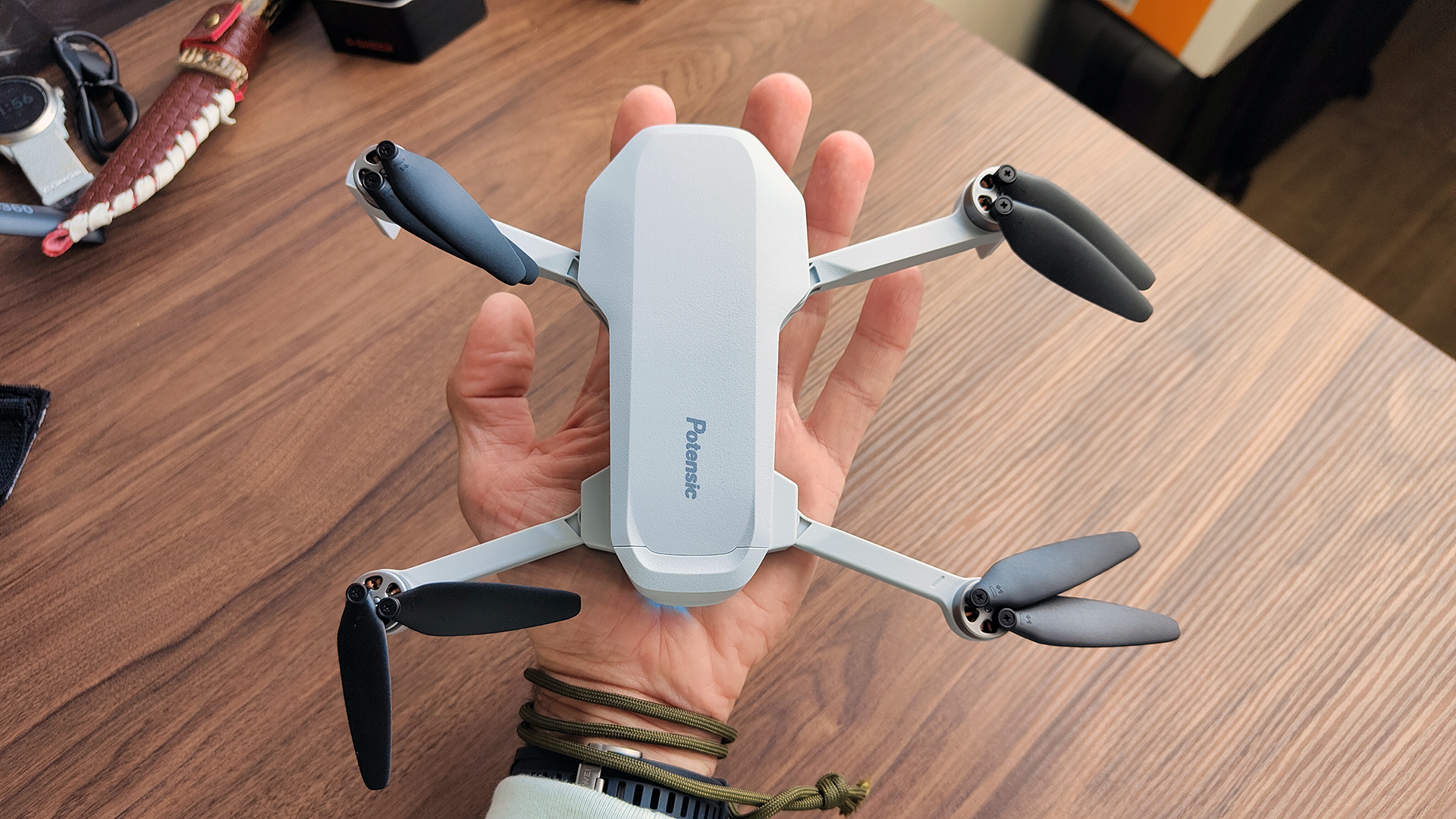
Potensic Atom SE review in a nutshell: A thoroughly enjoyable sub-250g drone with easy-to-master controls and plenty of flying modes to choose from. The supposedly 4k camera is far from impressive, and footage stabilisation is a bit clunky, but beginner pilots on a budget should consider the Atom SE as their first (or next) drone.
The best beginner drone market is probably the busiest. This is always the case; there will always be more beginners than pros, so accessibly-priced, simple drones will always be in higher demand than pricey ones featuring thousands of flying options. The Potensic Atom SE is in the former group but offers many high-end features beginner pilots will enjoy, like Follow Me, Circle Flight and Waypoint Flight modes.
Potensic is well known for being one of the best cheap drone manufacturers. These days, inexpensive models can often be found among the best drones as technical advancement blurs the line between high-end and low-cost models. We reviewed many Potensic drones before; the Atom SE inherits some of their flows but also tries to improve upon them to offer a more well-rounded package. Read my full Potensic Atom SE review below for more details.
(First reviewed March 2023)
Potensic Atom SE review: Price and availability
The Potensic Atom SE was launched in late 2022 and is available to buy now directly from Potensic UK and Potensic US for a recommended retail price of £250/$250. The Atom SE is also available to buy via third-party retailers such as Amazon UK and Amazon US—AU price and availability TBC.
There are two kit options to choose from: Standard and Fly More. The Standard Kit only includes one battery and the controller (and cables), while the Fly More Kit adds an extra battery and a carry case. The latter retails for £300/$300. Both versions were out of stock on the Potensic website at the time of writing, although Amazon UK had a few Fly More Kits available.
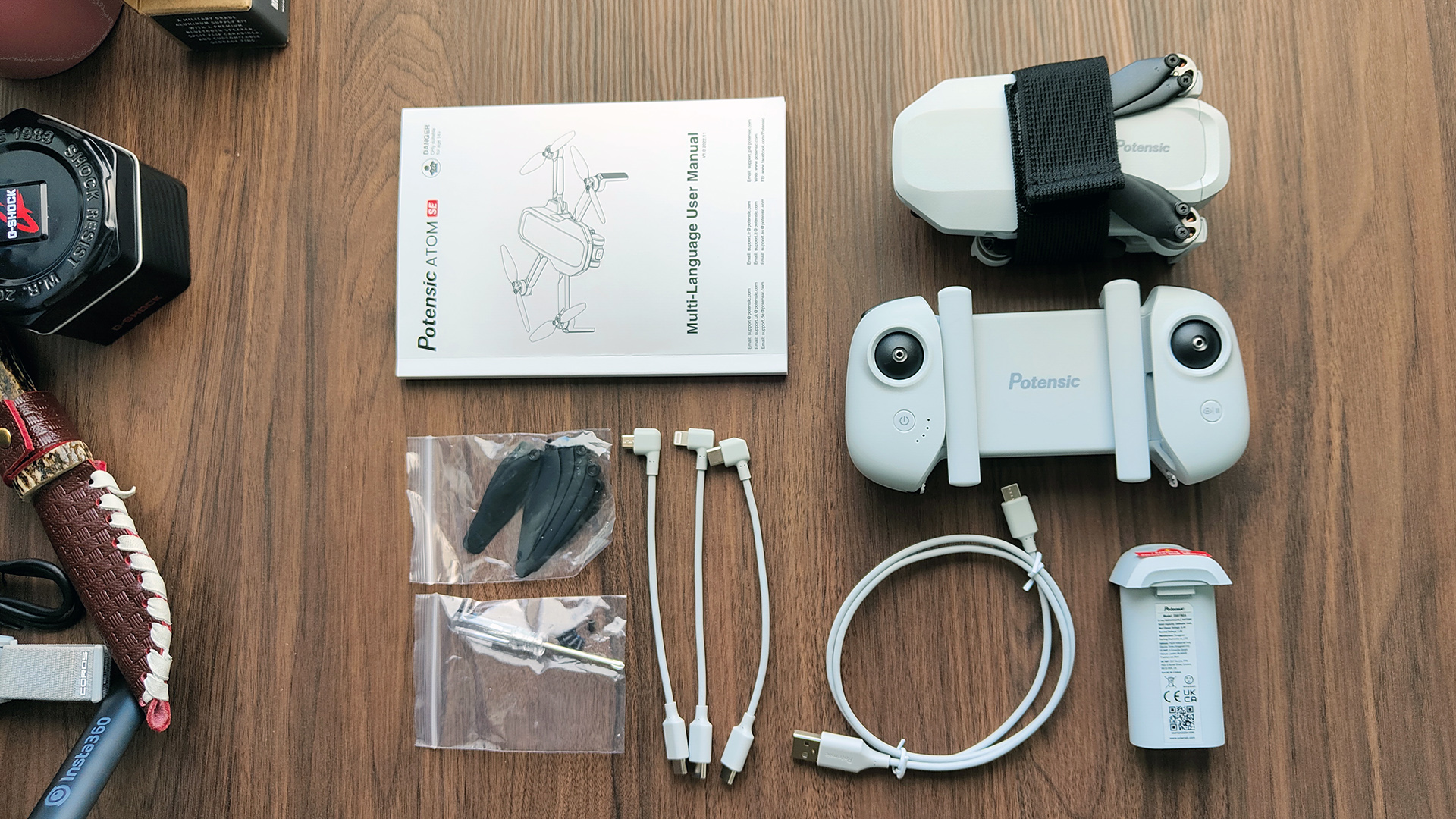
Potensic Atom SE review: What's in the box?
I tested the Potensic Atom SE Fly More Kit, which includes a few extra bits on top of the Standard Kit. Both versions have the drone, a battery, an instruction manual, the controller, a full set of spare propeller blades and tools to replace them, a long USB cable to charge the battery and three cables (Micro-USB, USB-C and Lightning) to connect your smartphone with the controller.
The Fly More Kit adds a carry bag and an extra battery for an extra £50/$50, which is a pretty good deal as it extends the flight time from around 30 minutes to 60 minutes. The carry bag is well-padded and has more than enough space/pockets to store all your Potensic Atom SE kit and then some safely. What's not included in the box is a micro-SD card; you'll need this to record footage, as the Atom SE has no internal memory.
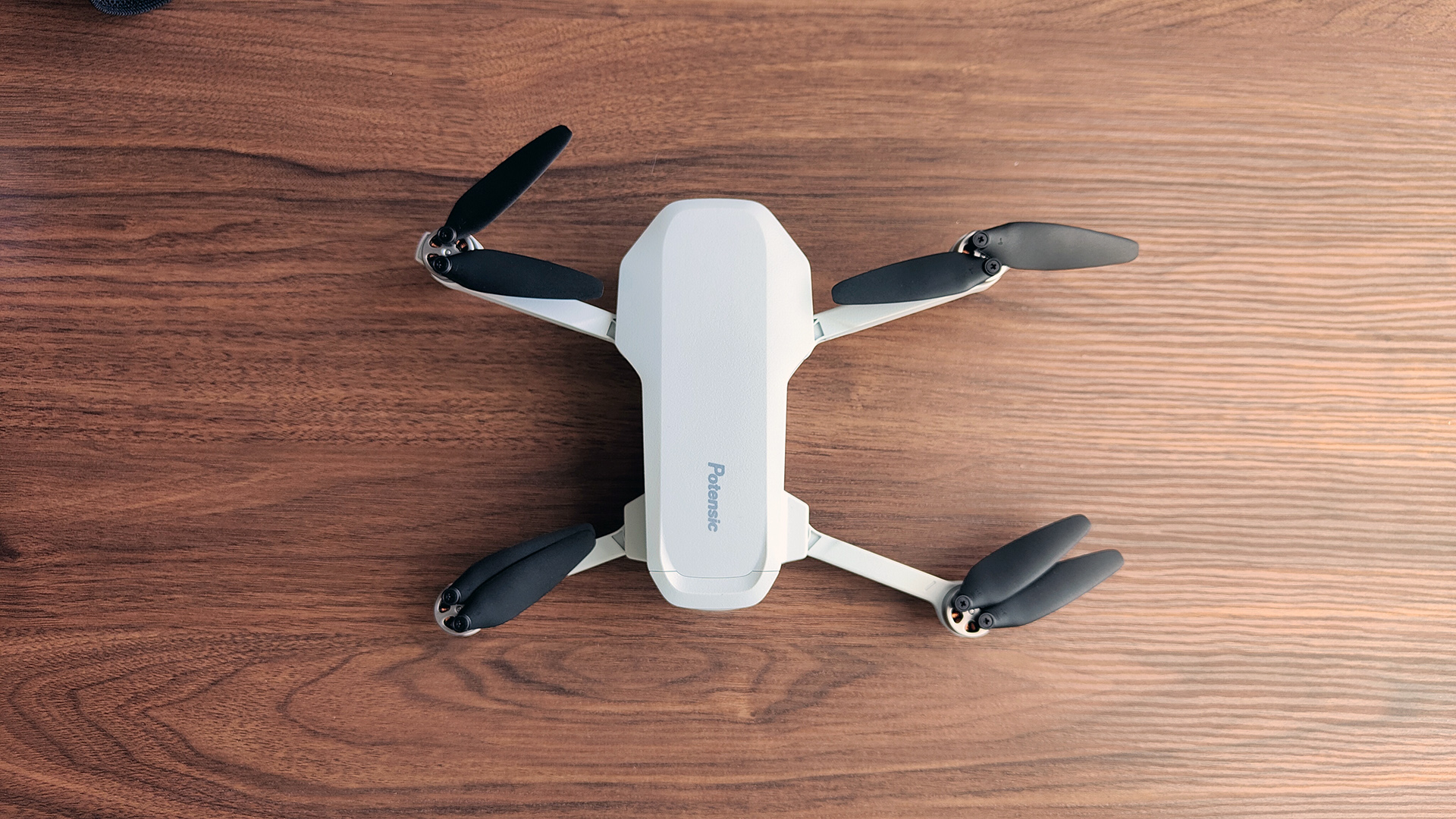
Potensic Atom SE review: Design
The Potensic Atom SE is a compact drone with a foldable design that makes it easy to store and transport the device safely. The folding mechanism is straightforward; you need to unfold the front legs first, then the rear ones– simple. This is a sub-250-gram drone, meaning pilots with only a Flyer ID can use it (in the UK).
You'll find the camera and sensor at the front of the drone. The Atom SE is fitted with a visual positioning system and GPS unit to enable the drone to hover at low altitudes and return safely home. It's capable of producing 4K/30FPS videos and 1.2-megapixel stills.
You'll find the battery and status light at the rear of the unit. The charging port is located on the battery, which you can charge separately from the drone (the Atom SE hasn't got an internal battery). The Atom SE's external shell is hard, grey plastic with the brand name subtly printed on the top.
Due to the greyish colour of the drone – and thanks to the weather being awful 90% of the time in the UK – it was sometimes hard to work out where the Atom SE was in the sky. The unit is small and lightweight (which is great as it can fly longer), making it even harder to detect where it is, especially when it's cloudy.
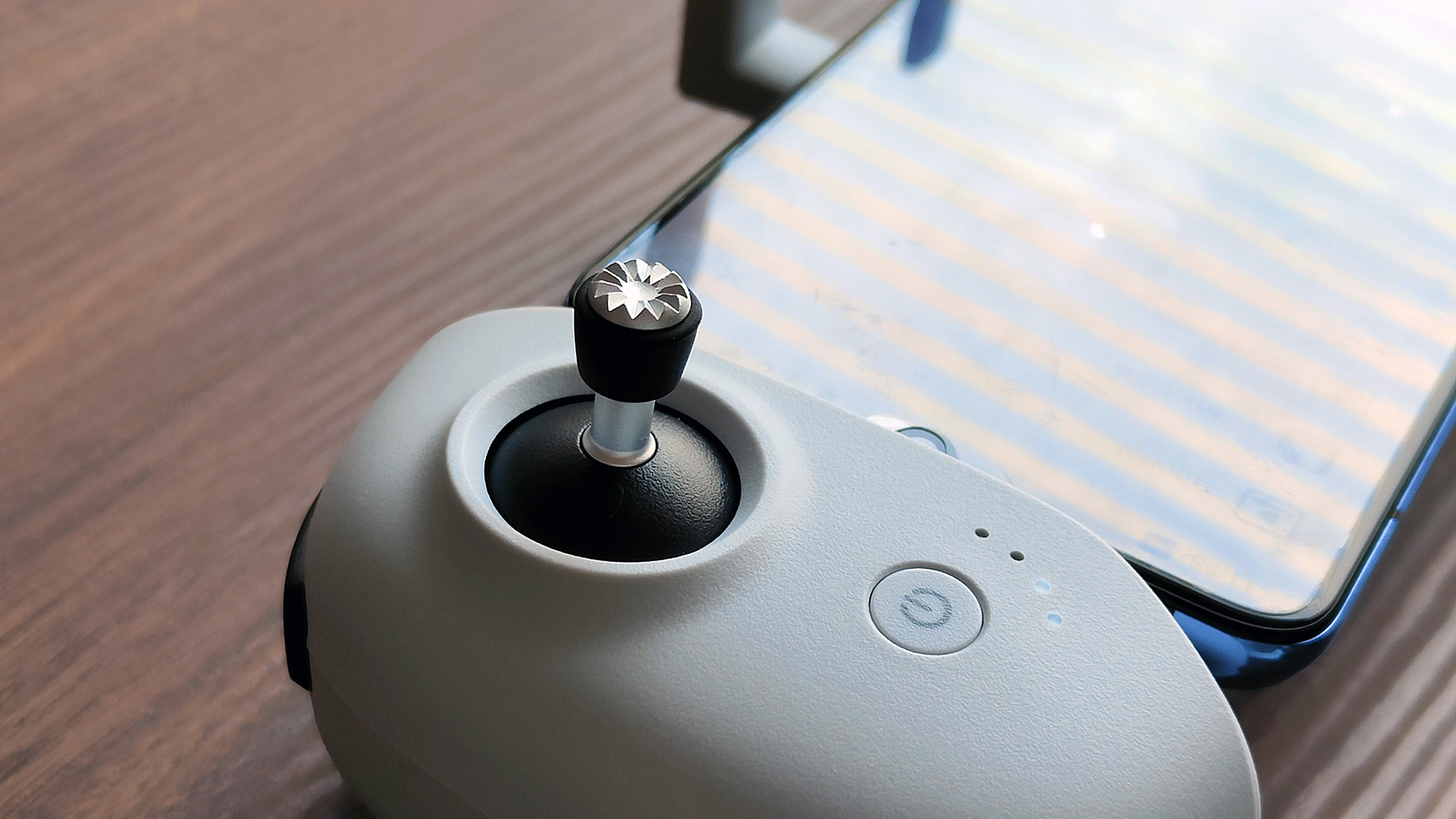
The controller is made from the same grey plastic and actually slightly larger than the drone itself. This makes sense, as the controller should be more ergonomic than compact. I would've appreciated rubberised grips, but that's just my personal preference.
Like the Atom SE, the controller has a folding design; the two antennas fold out, and the length of the controller is adjustable based on the smartphone you're using. To make the controller flatter when not in use, the two control sticks can be unscrewed and stored in the slots at the bottom of the controller.
There are two shoulder buttons (one for taking photos, the other for starting/stopping video recording) and a wheel that adjusts the camera position vertically (more on this below). You'll find a dedicated 'return home' button on the right.

Potensic Atom SE review: Flight performance
I found the Potensic Atom SE a delight to fly. The controls are easy to master, and there are plenty of features to play around with. It's also super responsive, with only a minimal delay between the control stick and the drone's movement. I'm not an ultra-experienced drone pilot, yet I could fly the Atom SE without any issues.
The control interface is equally as easy to work out. Essential info (altitude, distance from controller, etc.) about the drone's position is displayed next to the small window in the bottom left corner. By default, you see the camera feed in the big window and the GPS position in the small window, and you can swap these around by tapping the small window.
Speaking of GPS: the Potensic Atom SE has a built-in GPS chip to determine its position and help it navigate back home automatically. The drone also hovers more efficiently when latched onto the GPS signal. However, this can take a while to happen. For example, when I exited the app and logged back in, it took some time for the chip to find the signal again, although I didn't physically move the drone.
The Atom SE is super lightweight, so wind speed dramatically affects the drone's flight pattern. This doesn't mean the Atom SE is tricky to fly; if you press the control stick forward, the drone will fly in that direction. However, the horizon on the footage might not look quite straight (more on this in the next section).
On a more positive note, the Potensic Atom SE has a 4 km (~2.5 miles) communication distance, so you can fly it pretty far if you want to. Of course, you shouldn't fly it farther than you can see it, but on a clear day and in an area where you can't pose any threat to others or the environment, it's possible to fly the drone quite far out.
There are a few different flight modes, including Follow Me, Circle Flight and Waypoint Flight modes. I found these all to work fine, and I can see the appeal of using the Circle Flight mode when you're standing on top of a peak or in a middle of a clearing.
Potensic's compact drone has an emergency return-to-home mode, which is automatically activated when the battery drops to 25%. You'll notice this being turned on, as the controller/app will start beeping loudly. You can disable this and fly the Atom SE back home yourself, should you wish.
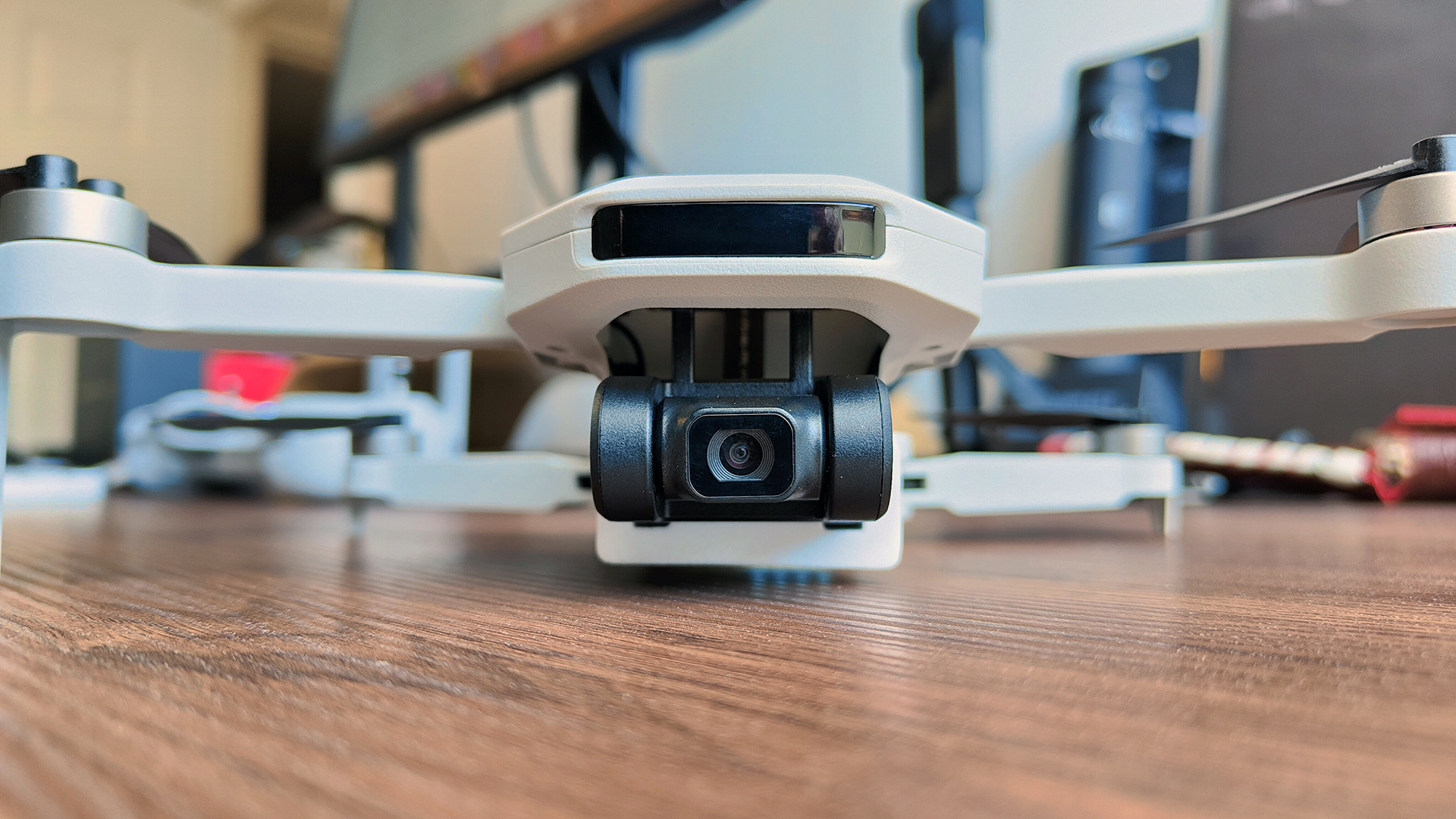
Potensic Atom SE review: Camera performance
The Potensic Atom SE is equipped with a 12MP sony CMOS sensor capable of shooting 12MP photos in JPG and RAW (DNG) formats and 4K HD video at 30fps. It has a 118° field of view and a +20° to -90° vertical camera adjustment angle. The camera uses ShakeVanish electronic stabilisation to smooth video footage.
Sadly – and while this all sounds good – the Atom SE's video capabilities leave much to be desired, especially when the light conditions aren't perfect. The footage doesn't feel like 4K, and it generally looks grainy. There is no shakiness, so that's good, and you can adjust the camera angle vertically. But apart from that, it's hard to say anything nice about the Potensic Atom SE's camera.
Due to the way the drone moves and its inability to withstand wind, the footage often ends up jerky and not level. Instead of the gently rolling back-and-forth movement FPV drones produce, the Potensic Atom SE's videos look like someone fixed an action cam at the bottom of a pendulum – it swings rapidly from one side to the other.
There is no telephoto mode either, which further limits the versatility of the Atom SE. It's not impossible to shoot decent videos with the drone, but the conditions must be perfect: no wind, plenty of diffused light, a straight flight path, etc. The Follow Me mode is okay, although you might not end up centred in the frame, and I quite enjoyed the Circle Flight mode. Again, you might need to adjust the camera angle for the best effect.
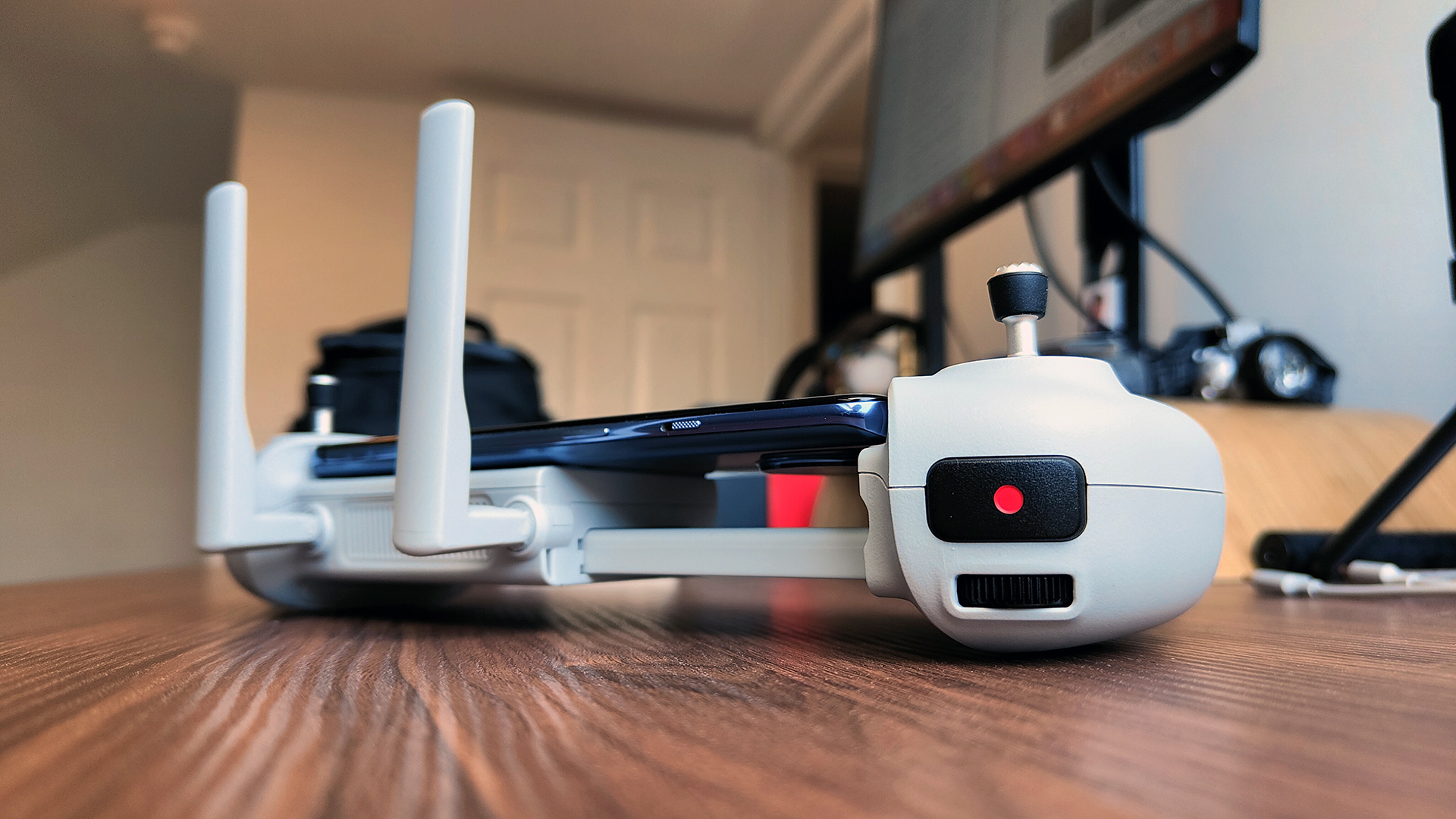
Potensic Atom SE review: Verdict
Despite the underwhelming camera performance, I thoroughly enjoyed the Potensic Atom SE experience. This little drone flies well and has plenty of top-notch features to get beginner drone pilots on board. It's great that the Atom SE offers many different flight modes and automated processes, making it an excellent beginner-friendly drone.
It's interesting to see that the Atom SE fails in the area all other Potensic drones do: camera performance. One would think the company would pay extra attention to this to ensure more people will choose their products over competitors, but the lack of footage quality could be just down to price, or more like, Potensic trying to keep the cost of the drone low enough.
If you're looking for a cheap DJI Mini alternative, consider the Atom SE. It's not massively more affordable than the DJI Mini 2 SE but offers higher-quality footage (which, as discussed above, isn't the case), more flying modes and extra features, making it more appealing to those who prioritise the flying experience over camera footage.
Potensic Atom SE review: Also consider
One obvious Atom Se alternative is the DJI Mini 2 mentioned above. It excels in every department, from its confidence-inspiring flight characteristics and rock-steady reliability to its plethora of in-flight safety tech and brilliant collection of pilot aids. It is right up there will the best small-bodied aerial tripods money can buy. Read Derek's full DJI Mini 2 review.
The pocket-sized Autel Evo Nano is equipped with a 1/2-inch camera for ravishing 4K footage and 48-megapixel stills, plus three-way obstacle avoidance for added in-flight safety. It's the first non-DJI camera drone to win T3's full five-star accolade. And deservedly so. Read our full Autel Evo Nano review (also by Derek).







